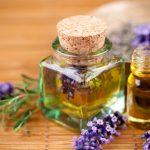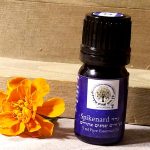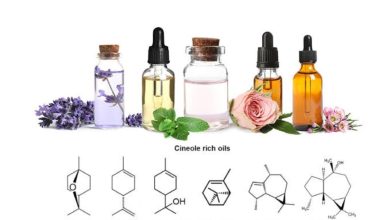What Does Ylang Ylang Essential Oil Smell Like?
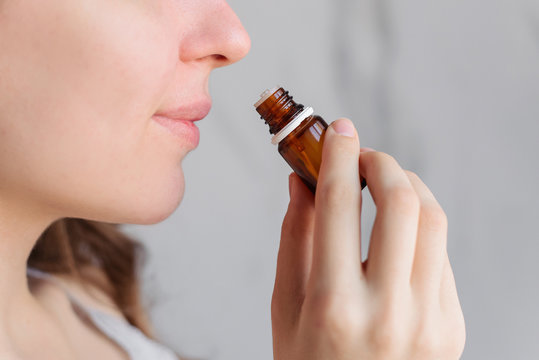
Ylang ylang essential oil is derived from the flowers of the Cananga tree (Cananga odorata), which is native to tropical regions of Asia, particularly Indonesia, Malaysia, and the Philippines. The essential oil is extracted through steam distillation of the flowers.
Ylang ylang oil is renowned for its sweet, floral fragrance with hints of jasmine and neroli. It is widely used in aromatherapy and perfumery for its uplifting and balancing properties. Here are some common uses and benefits of ylang ylang essential oil:
1. Aromatherapy: Ylang ylang oil is often used in aromatherapy to promote relaxation, reduce stress, and uplift mood. Its soothing scent is believed to have a calming effect on the mind and body, making it an excellent choice for aromatherapy diffusers, massage oils, and bath blends.
2. Skin Care: Ylang ylang oil is known for its skin-balancing properties and is often used in skincare products for its ability to regulate sebum production and improve skin tone. It is believed to help moisturize and soothe dry, irritated skin while also promoting a youthful complexion.
3. Hair Care: Ylang ylang oil is used in hair care products for its nourishing properties. It is believed to help strengthen hair follicles, reduce hair loss, and promote healthy, shiny hair. Adding a few drops of ylang ylang oil to your shampoo or conditioner may help improve the overall health and appearance of your hair.
4. Aphrodisiac: Ylang ylang oil has a long history as an aphrodisiac and is often used to enhance romantic mood and intimacy. Its sweet, exotic aroma is believed to stimulate the senses and evoke feelings of sensuality and passion.
5. Relief from PMS Symptoms: Some women use ylang ylang oil to help alleviate symptoms of premenstrual syndrome (PMS), such as mood swings, irritability, and anxiety. Its calming and mood-balancing properties may help ease emotional discomfort associated with hormonal changes.
6. Natural Insect Repellent: Ylang ylang oil has insect-repelling properties and is often used in natural insect repellent sprays and lotions. Its floral scent may help deter mosquitoes, flies, and other pests, making it a popular choice for outdoor activities.
It’s important to note that ylang ylang essential oil is potent and should be used with caution. It can cause skin irritation in some individuals, especially those with sensitive skin. It’s always a good idea to perform a patch test before using ylang ylang oil topically, and dilute it with a carrier oil (such as coconut oil or jojoba oil) before applying it to the skin. Pregnant women and individuals with certain medical conditions should consult with a healthcare professional before using ylang ylang oil.
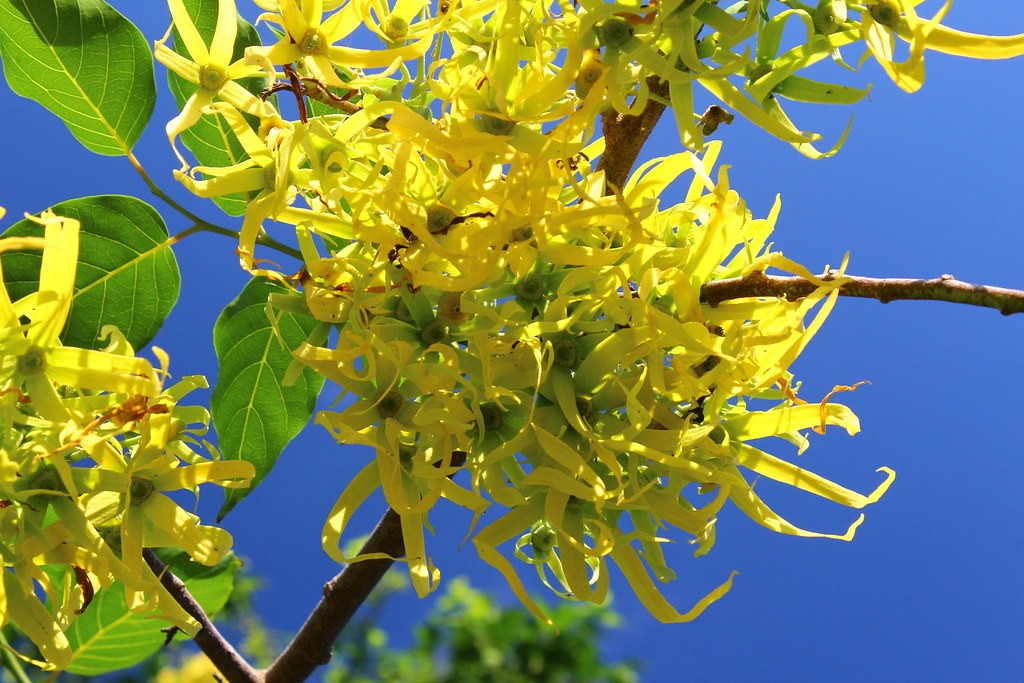
What Does Real Ylang Ylang Essential Oil Smell Like?
A real Ylang ylang essential oil has a sweet, floral, and exotic fragrance with hints of jasmine and neroli. The aroma is often described as rich, sensual, and deeply floral, with notes of sweetness and warmth. It has a complex and captivating scent profile that is both uplifting and calming, making it popular in perfumery and aromatherapy.
The fragrance of genuine ylang ylang oil can vary depending on factors such as the quality of the flowers, the extraction method used, and the region where the flowers are grown. Generally, ylang ylang essential oil is characterized by its intense floral aroma, which is often compared to the scent of fresh flowers in full bloom.
Different grades of ylang ylang oil (such as extra, I, II, and III) may have varying degrees of intensity and complexity in their fragrance. Extra grade ylang ylang oil is typically the most potent and has the most intense floral aroma, while lower grades may have a softer or more subtle scent.
Overall, the aroma of ylang ylang essential oil is prized for its ability to evoke feelings of relaxation, romance, and sensuality. It is often used in perfumes, candles, and skincare products to impart a luxurious and exotic fragrance that appeals to the senses
Side Effects Of Ylang Ylang Essential Oil Smell
Ylang ylang essential oil is generally considered safe for aromatherapy and topical use when properly diluted. However, like any essential oil, it can cause adverse reactions in some individuals, particularly when used in excessive amounts or by those with sensitive skin or certain medical conditions. Here are some potential side effects and precautions associated with the smell of ylang ylang essential oil:
1. Skin Irritation: Some individuals may experience skin irritation or allergic reactions when exposed to ylang ylang essential oil, especially if it is applied directly to the skin without proper dilution. It’s essential to perform a patch test before using ylang ylang oil topically and dilute it with a carrier oil to minimize the risk of irritation.
2. Sensitization: Prolonged or repeated exposure to undiluted ylang ylang oil may lead to sensitization, where the skin becomes increasingly sensitive to the oil over time. To prevent sensitization, it’s recommended to use ylang ylang oil in moderation and avoid prolonged exposure.
3. Photosensitivity: Some essential oils, including ylang ylang oil, may increase the skin’s sensitivity to sunlight and UV rays, leading to sunburn or skin damage. It’s important to avoid applying ylang ylang oil to the skin before sun exposure and to use sunscreen if necessary.
4. Respiratory Irritation: Inhaling ylang ylang oil directly from the bottle or diffusing it in high concentrations may irritate the respiratory tract in some individuals, especially those with asthma or respiratory conditions. It’s best to dilute ylang ylang oil before inhaling it or using it in aromatherapy diffusers.
5. Headache or Nausea: In rare cases, the strong fragrance of ylang ylang oil may trigger headaches or nausea in sensitive individuals, particularly when used in large amounts or in poorly ventilated spaces. If you experience any adverse reactions while using ylang ylang oil, discontinue use and consult a healthcare professional.
6. Interaction with Medications: Ylang ylang oil may interact with certain medications or exacerbate certain medical conditions. It’s important to consult with a healthcare professional before using ylang ylang oil, especially if you are pregnant, nursing, or taking medication.
Where to buy Ylang Ylang Essential Oil
Ylang ylang essential oil is widely available for purchase from various retailers, both online and in physical stores. Here are some places where you can buy ylang ylang essential oil:
1. Online Retailers:
• Amazon: Amazon offers a wide selection of ylang ylang essential oil from various brands and sellers. You can find different grades and sizes of ylang ylang oil to suit your needs.
• Etsy: Etsy is another online marketplace where you can find ylang ylang essential oil from small businesses and independent sellers. You may find unique blends and artisanal products on Etsy.
• Well.ca: Well.ca is a Canadian online retailer that offers a range of natural health and wellness products, including essential oils like ylang ylang oil.
• Plant Therapy: Plant Therapy is a popular online retailer specializing in essential oils and aromatherapy products. They offer high-quality ylang ylang essential oil, as well as blends and accessories.
2. Health Food Stores:
• Many health food stores and natural pharmacies carry a selection of essential oils, including ylang ylang oil. Look for stores in your area that specialize in natural products and aromatherapy.
3. Beauty and Wellness Stores:
• Some beauty and wellness stores, such as Sephora or The Body Shop, may carry ylang ylang essential oil or products containing ylang ylang oil as an ingredient. Check their websites or visit their stores to see if they have it in stock.
4. Local Markets and Specialty Shops:
• Local markets, craft fairs, and specialty shops may also sell ylang ylang essential oil, especially if they specialize in natural or holistic products. Be sure to check out these local establishments for unique finds.
5. Direct from Manufacturers:
• Some essential oil manufacturers and distributors sell their products directly to consumers through their websites or catalogs. You can often find a wide selection of essential oils, including ylang ylang oil, from these sources.
When purchasing ylang ylang essential oil, be sure to choose a reputable brand that offers pure, high-quality oil. Look for products that are labeled as 100% pure essential oil and undergo third-party testing for quality and purity. Additionally, consider factors such as the extraction method used, the grade of the oil, and customer reviews when making your purchase decision.

